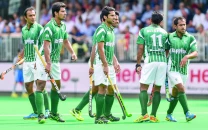‘No pure, neatly-defined Islamic law in Pakistan’
Russian scholar says environmental issues keep people in poverty.

Islamic law can be flexible and pluralistic and, contrary to stereotype, can be used in Pakistan to promote democracy and good governance in the country.
“The analysis of Pakistani Islamic law suggests that there is no pure, neatly-defined Islamic law,” said Dr Ihsan Yilmaz, associate professor at Fatih University, Istanbul, at an international conference on ‘Pakistan: Challenges to Democracy, Governance and National Unity’ at the Punjab University on Monday.
“Ulema, intellectuals, opinion leaders and judges can debate Islamic law in the public sphere and agree to define, interpret and apply it in a human-rights-friendly fashion despite the pressure of politics,” said Dr Yilmaz, reading from his paper titled ‘Do Islamic Laws Challenge Democracy and Good Governance in Pakistan?’
The Turkish scholar said that the lack of state penetration in society, coupled with an inconsistent and unstable legal system, had been a source of “unofficial legal pluralism” in Pakistan. Considerable variations in the enforcement and interpretation of Islamic laws by the courts intensified this pluralism.
He said that in the past, judges of “the Federal Shariat Court and Supreme Court made use of Islamic concepts such as justice and public welfare to get rid of the oppressive as well as the liberal laws made by the politicians”.
A Russian scholar said environmental problems in rural areas were holding back social and economic development in Pakistan.
The country’s agricultural environment is faced with inefficient water use and the “capricious power of water”, resulting in devastating floods; decaying irrigation and drainage systems on which the major crops depend; and rapidly growing deforestation contributing to soil erosion, said Prof Vyacheslav Y Belokrenitsky of the Institute of Oriental Studies, Russian Academy of Sciences in Moscow.
He said these inter-related phenomena made it difficult to solve the problems of mass poverty, especially in the rural areas, of employment and of increasing the social weight of the middle class. He said the weakness of the middle class was one of the principal causes of fragile democracy and of the comparative inefficacy of governance.
Prof Stephen D McDowell, director of the School of Communication at Florida State University, spoke about the relationship between media and public opinion and raised questions about media ethics and regulation in Pakistan.
Prof Michel Boivin of the Centre for South Asian Studies in Paris said French scholars had paid little attention to Pakistan – except for the archaeological excavations at sites of the historic Indus Civilisation – till the Taliban took over Afghanistan in the 1990s.
Prof Jean-Luc Racine, a senior research fellow from France, said that the Pakistani nation was shaped beyond strong ideological strands by socio-economic dynamics and identity affiliations.
He said that more than anything else, the deficit of good governance was probably one of the key factors behind the present challenges Pakistan faced.
Prof Dr Rasool Bakhsh Raees of the Lahore University of Management Sciences said that elite networks dominated the mainstream political party system, electoral contests, parliament and the political executive. He said, however, that a silent social revolution was taking place in Pakistan.
Earlier, addressing the inaugural session, PU Vice Chancellor Dr Mujahid Kamran said that everyone in Pakistan should agree to allocating at least four percent of GDP to education. He said a lack of education was the root cause of all the country’s problems.
Prof Tatiana Oranskaia from Germany, Prof Salim Cevik from Sweden, Prof Necdet Rosun from Turkey, Prof Sharif Al Mujahid from Karachi, Prof Vladimir I Sotnikov from Russia, Prof Huma Naz Siddiqui Baqai from the Institute of Business Administration in Karachi, Prof Nazir Hussain from Quaid-i-Azam University in Islamabad and Amjad Abbas Magsi of Punjab University also presented papers at the first day of the conference.
Published in The Express Tribune, October 25th, 2011.



















COMMENTS
Comments are moderated and generally will be posted if they are on-topic and not abusive.
For more information, please see our Comments FAQ